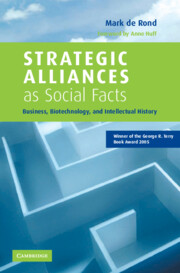Book contents
- Frontmatter
- Contents
- List of figures
- Foreword by Anne Sigismund Huff
- Acknowledgements
- Introduction
- 1 Paradoxes of alliance life
- 2 The context of drug discovery
- 3 Through the looking glass 1: Rummidgen and Plethora
- 4 Through the looking glass 2: Cambiogen and Plethora
- 5 Through the looking glass 3: Bionatura and Pflegum Courtal
- 6 Putting two and two together: revisiting theory and practice
- 7 Strategy, structure, and structuration: the general in the particular
- 8 The hedgehog and the fox: the particular in the general
- 9 The legitimacy of messiness
- Appendix: On methodology and definitions
- References
- Index
8 - The hedgehog and the fox: the particular in the general
Published online by Cambridge University Press: 22 September 2009
- Frontmatter
- Contents
- List of figures
- Foreword by Anne Sigismund Huff
- Acknowledgements
- Introduction
- 1 Paradoxes of alliance life
- 2 The context of drug discovery
- 3 Through the looking glass 1: Rummidgen and Plethora
- 4 Through the looking glass 2: Cambiogen and Plethora
- 5 Through the looking glass 3: Bionatura and Pflegum Courtal
- 6 Putting two and two together: revisiting theory and practice
- 7 Strategy, structure, and structuration: the general in the particular
- 8 The hedgehog and the fox: the particular in the general
- 9 The legitimacy of messiness
- Appendix: On methodology and definitions
- References
- Index
Summary
If the theory review of the first chapter seemed a little critical, its critique was intended primarily at atomistic approaches to alliance life. The case studies should have been sufficient indication of their limitations and, in the specific cases of Ring and van de Ven (1994) and Doz (1996), also their contributions. Without seeking to diminish such contributions, one wonders whether these do not risk seeing alliance success primarily as the product of voluntary and purposive managerial intervention. Population-level approaches, conversely, may risk being too deterministic – in leaving too little room for chance and choice – and too expecting of progress. Clearly, the case is not against those who explain alliance life but those who explain away its quintessence and individuality. Experience precedes form, and may ultimately be more important than it.
The previous chapter suggested that, despite their individuality, there is order in alliance life. Order exists where (and to the extent to which) actors draw on underlying social structures to inform their strategic conduct. The chapter provided several examples of structuration processes from the case studies. But it delivered only the first segment of a multilectic account (cf. Huff, 1981), in leaving the idiosyncratic yet to be formally accounted for. While structuration theory may have been helpful in explaining order, we lack a formal theory to answer and justify the peculiar.
- Type
- Chapter
- Information
- Strategic Alliances as Social FactsBusiness, Biotechnology, and Intellectual History, pp. 156 - 172Publisher: Cambridge University PressPrint publication year: 2003



